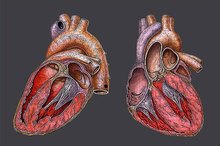What Are the Treatments for Cardiomegaly?
Cardiomegaly is an enlarged heart and a symptom of cardiomyopathy, or disease of the heart 1. Cardiomegaly occurs from multiple causes, and poorly controlled high blood pressure is a common factor. The American Heart Association explains there are three types of cardiomyopathy, each with the end result of an enlarged heart: dilated, hypertrophic and restrictive 1. The treatment for cardiomegaly depends on the type of cardiomyopathy and underlying disease process.
If you are experiencing serious medical symptoms, seek emergency treatment immediately.
Fluid Control
Each type of cardiomyopathy interferes with the pumping function of the heart 1. As the heart fails, a patient typically experiences fluid overload. MayoClinic.com reports that the frequent use of diuretics can remove excess fluid from the cardiovascular system. Controlling a patient’s fluid volume helps maintain a stable blood pressure and relieves the symptoms of shortness of breath, fatigue and cough caused by cardiomegaly. The diuretics furosemide, spironolactone and hydrochlothiazide can be used as treatments for cardiomegaly.
- Each type of cardiomyopathy interferes with the pumping function of the heart 1.
- Controlling a patient’s fluid volume helps maintain a stable blood pressure and relieves the symptoms of shortness of breath, fatigue and cough caused by cardiomegaly.
Blood Pressure Control
6 Types of Heart Doctors You Should Know About
Learn More
High blood pressure increases the workload of and strain on the heart and other organs like the kidneys. A treatment for cardiomegaly includes controlling blood pressure through the use of medications such as angio-converting enzymes and angiotensin-receptor blockers. For example, physicians may prescribe lisinopril, captopril or losartan to stabilize blood pressure and improve blood flow to the heart muscle and the kidneys.
Strengthen the Heart
Cardiomegaly weakens the heart muscle and reduces the ability of the heart to pump blood to the rest of the body. Treatment for cardiomegaly includes the use of beta blockers and cardioglycosides to strengthen the pumping function of the heart. Another symptom of cardiomegaly is an elevated heart rate. Beta blockers like metoprolol and cardioglycosides like digoxin reduce the heart rate. This action allows the heart to better fill with blood, which, combined with a stronger pumping action improves cardiac output.
- Cardiomegaly weakens the heart muscle and reduces the ability of the heart to pump blood to the rest of the body.
- Treatment for cardiomegaly includes the use of beta blockers and cardioglycosides to strengthen the pumping function of the heart.
Cardiac Resynchronization Therapy
What is Mild Cardiomegaly?
Learn More
When medications are not enough to control the symptoms of cardiomegaly, a pacemaker may be inserted to help synchronize the beating action of the heart. The authors of the 2006 edition of “Medical-Surgical Nursing: Critical Thinking for Collaborative Care” explain that a pacemaker that generates electrical impulses in both ventricles allows the heart to fill with blood and pump better 4. Patients with cardiomegaly often experience dangerous irregular heart rhythms 3. Physicians treat this problem with special pacemakers called implantable-cardioverter defibrillators, which detect and eliminate lethal heart rhythms by delivering an electrical shock directly to the heart.
Heart Valve Repair
If the cause of the cardiomegaly is a poorly functioning heart valve, the affected valve can be surgically repaired or replaced. Patients may receive a mechanical or biologic heart valve.
Heart Pump
A heart pump or ventricular assist device is a surgically implanted mechanical pump that takes over the work of the ventricles. This treatment for cardiomegaly is reserved for the sickest patients waiting for a heart transplant 3.
Heart Transplant
The final treatment option for cardiomegaly is a heart transplant 3. The wait for a heart is long due to the shortage of donors. Patients receive supportive care and symptom management until a donor heart becomes available.
Related Articles
References
- American Heart Association: Cardiomyopathy
- Texas Heart Institute: What Treatment Does Mild Cardiomegaly Require?
- “Medical-Surgical Nursing: Critical Thinking for Collaborative Care”; Donna D. Ignatavicius & M. Linda Workman; 2006
- Amin H, Siddiqui WJ. Cardiomegaly. [Updated 2019 Jun 4]. In: StatPearls [Internet]. Treasure Island (FL): StatPearls Publishing; 2019 Jan-.
- Mu J, Zhang G, Xue D, Xi M, Qi J, Dong H. Sudden cardiac death owing to arrhythmogenic right ventricular cardiomyopathy. Medicine. 2017;96(47). doi:10.1097/md.0000000000008808
- Watson RD, Gibbs CR, Lip GY. ABC of heart failure. Clinical features and complications. BMJ. 2000;320(7229):236–239. doi:10.1136/bmj.320.7229.236
- Kannel WB, Dagostino RB, Silbershatz H, Belanger AJ, Wilson PWF, Levy D. Profile for Estimating Risk of Heart Failure. Archives of Internal Medicine. 1999;159(11):1197. doi:10.1001/archinte.159.11.1197
- The role of imaging in the diagnosis and management of hypertrophic cardiomyopathy, Weissler-Snir A, Crean A, Rakowski H, Expert Rev Cardiovasc Ther. 2016;14(1):51-74
Writer Bio
Patricia Nevins is a registered nurse with nearly 20 years of nursing experience. She obtained her Master of Science in nursing with a focus in education from the University of Phoenix. Nevins shares her passion for healthy living through her roles as educator, nursing consultant and writer.








